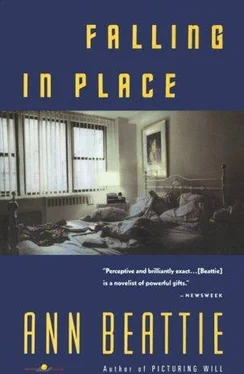Ann Beattie - Falling in Place
Здесь есть возможность читать онлайн «Ann Beattie - Falling in Place» весь текст электронной книги совершенно бесплатно (целиком полную версию без сокращений). В некоторых случаях можно слушать аудио, скачать через торрент в формате fb2 и присутствует краткое содержание. Год выпуска: 1991, Издательство: Vintage, Жанр: Современная проза, на английском языке. Описание произведения, (предисловие) а так же отзывы посетителей доступны на портале библиотеки ЛибКат.
- Название:Falling in Place
- Автор:
- Издательство:Vintage
- Жанр:
- Год:1991
- ISBN:нет данных
- Рейтинг книги:4 / 5. Голосов: 1
-
Избранное:Добавить в избранное
- Отзывы:
-
Ваша оценка:
- 80
- 1
- 2
- 3
- 4
- 5
Falling in Place: краткое содержание, описание и аннотация
Предлагаем к чтению аннотацию, описание, краткое содержание или предисловие (зависит от того, что написал сам автор книги «Falling in Place»). Если вы не нашли необходимую информацию о книге — напишите в комментариях, мы постараемся отыскать её.
Falling in Place — читать онлайн бесплатно полную книгу (весь текст) целиком
Ниже представлен текст книги, разбитый по страницам. Система сохранения места последней прочитанной страницы, позволяет с удобством читать онлайн бесплатно книгу «Falling in Place», без необходимости каждый раз заново искать на чём Вы остановились. Поставьте закладку, и сможете в любой момент перейти на страницу, на которой закончили чтение.
Интервал:
Закладка:
“Who’s meeting their plane?” Tess said.
“Nobody.”
“It doesn’t seem right. Of course I wasn’t invited. I always let myself be taken advantage of, and I won’t put myself in the position of being made a fool of, too. Of course, if they don’t come on the plane Friday, and I’m there, who would know but me that I was made a fool of again? My shrink would know. I’d tell the shrink. The shrink would try to make it all appear normal. He’s insidious that way. ‘Why blame yourself for meeting a plane?’ ”
“I’ll let you know if I hear anything.”
“If a woman goes to the airport and no one knows she’s there, does she still exist at the airport? Do you play philosophical games with your students, or are they too young? How can anyone be young?”
“I see it Monday through Friday.”
“Poor dear. Friday the men will come bounding home.”
Bounding? Spangle? Pigeon-toed Spangle? He loped, and seemed always on the verge of tripping himself.
Hanging on the kitchen wall was a picture of Spangle that she was very fond of, taken the summer before at Provincetown. He was flying a kite, but all that was visible in the picture was the string. He was photographed in profile, hair wind-whipped, a look of complete astonishment. He had not realized she was there, with her camera, up on the dunes. It had been a very gray day, before a big rain, and there were few people on the beach. She had seen him from far off, and had run to come up behind him. She had time to focus, and that was about all. The picture was a little grainy. That surprised look of his, though — it had been perfectly captured. It was the same look he had when she struggled awake in the dimly lit bedroom to put her face in his and say, “Spangle-stop. There is no fireball.”
She saw that it was raining. That meant that she would have an excuse not to go to the laundry. She disliked the laundry next to the donut shop, the closest to the apartment, because a lot of crazies always hung out there. The last time she went in a magician had been there — a magician on vacation from Hollywood, visiting his mother in New Haven, washing his dirty clothes.
“Do you have change for a quarter?” he had asked her.
The change machine was not six feet from where they stood. She had assumed that he was trying to pick her up. Silently, she had reached into her pocket and taken out two dimes and a nickel. He pocketed the nickel and held his hands out to her, palms up, one dime in each palm. Silently, he had closed his hands, shaken them three times, then opened his fingers. There were two dimes in the palm of each hand. She stared at the forty cents. He smiled and pocketed the money. Then he took out one dime, showed her both sides of it, and tossed it in the air. Twenty cents came down. He pocketed that.
“How did you do that?” she said.
“If it wasn’t a hoax, I’d be a rich man,” he said.
He took a pink sponge-rubber rabbit out of his pocket. He showed it to her, then put it in the palm of his hand. He closed his hand, shook it, and when it opened, there were two pink rabbits. He closed his hand and opened it again. One pink rabbit. He reached in his pants pocket and came out with what looked like the same rabbit, and handed it to her.
“Squeeze hard,” he said, “and think of your lover.”
What she had thought of, what she had been thinking of as he spoke, was that she had put her red blouse — the one that bled — into the washing machine. Dumping it in, it hadn’t even registered what she was doing. Everything was going to have to be bleached. Spangle would accuse her of being stoned. As she opened her hand, she jumped back: Dozens of tiny pink rabbits leaped into the air and showered down onto the floor of the laundromat. The magician bowed, and presented her with his business card.
“Available for parties,” he said. “Be in New Haven most of the summer. My routine for adult parties runs differently from this one, as you might surmise. What I need to know is the name of a good dentist.”
“I’m sorry,” she said. “I just moved here.”
“If I don’t find a dentist, I’m going to wake up one morning and open my mouth to brush my teeth, and my teeth are going to fly out like little bunnies.”
The man’s card had a California phone number, crossed out, and a Connecticut phone number written in. She put the card in the pocket of her jeans. When she got back to the apartment, she reached into her pocket to put her change and the card on the table. The twenty cents she could have sworn she did not use in the dryers was not there, and there were two cards with the magician’s name and phone number on them. The dimes did not reappear, and the cards did not replicate further.
There was also the time a young woman with a little boy asked her for three dollars so they could buy a pizza, and she had been so taken aback — the woman was nicely dressed, they both were rosy-cheeked — that she had given the woman three dollars. The woman had kissed the back of her hand as she held out the money. And of course there were always the usual crazies: Moonies, or whatever they were, who in exchange for money wanted to give her a paper flag on a toothpick; a drunk who went up to the dryer where her clothes were spinning and began waving his arm in a wild circle, imitating the motion of the machine. It would figure that Spangle would like living in New Haven. Before she knew him he had money and a nice house (anything with more than three rooms was by definition nice), but by the time he met her he had lost the house and the money. He had put up bail money for a friend who skipped the country. He had smoked it up and given parties in restaurants with Peking Duck for twenty. He had bought a Martin D-28 for a musician friend who was broke and who had smashed his own guitar against a cigar-store Indian he used as a coatrack when he broke a high? string for the third time that day. He had paid an ex-girlfriend’s thousand-dollar telephone bill so she could calm down and get her head straight. He had given money to the dog pound, bought a sports car and crashed it up, paid high insurance rates when his broken leg healed and he could drive again. Money just disappeared. It went. It was nothing like a handful of pink sponge. Money did not respond to pressure. Squeeze it as hard as you could, and when you opened your hand, there would be less of it. A psychiatrist had taken two thousand dollars of the money to tell Spangle — in part — that he was afraid of money, so he had gotten rid of it. Spangle believed this, but also believed that he and his money were psychically attuned: It had not wanted to stay with him, either. His money had itched to escape into the drawers of cash registers, into the deep pockets of maître d’s.
Her sister had introduced her to Spangle when she was eighteen. Her sister worked for the phone company in New Haven, before she met a rich older man who took her on vacations; the price she paid was having her lingerie drawer sprayed with Chant d’Arômes, and their dinner napkins with Norell. She could never wipe away the smell of flowers and ferns because their bath towels were sprayed with Wind Song. Her sister had been behind the counter when Spangle came in, ex-girlfriend in hand, to slap down the phone company’s latest threatening letter and to pay, in quarters, the one-thousand-dollar-plus phone bill the ex-girlfriend had run up. They had brought the rolls of quarters in the girl’s Save-A-Tree bag. Cynthia’s sister had been counting quarters into piles when Cynthia came in to meet her for dinner after work. There were piles of silver all over the counter, and her sister had looked up at her sadly and she had said: “Here’s somebody who thinks I’m to blame for the phraseology of the phone company’s dunning letters, and that I deserve some shit.” Then her sister had stopped counting and said to Spangle, “What did you say your name was? So I can always remember you?”
Читать дальшеИнтервал:
Закладка:
Похожие книги на «Falling in Place»
Представляем Вашему вниманию похожие книги на «Falling in Place» списком для выбора. Мы отобрали схожую по названию и смыслу литературу в надежде предоставить читателям больше вариантов отыскать новые, интересные, ещё непрочитанные произведения.
Обсуждение, отзывы о книге «Falling in Place» и просто собственные мнения читателей. Оставьте ваши комментарии, напишите, что Вы думаете о произведении, его смысле или главных героях. Укажите что конкретно понравилось, а что нет, и почему Вы так считаете.












